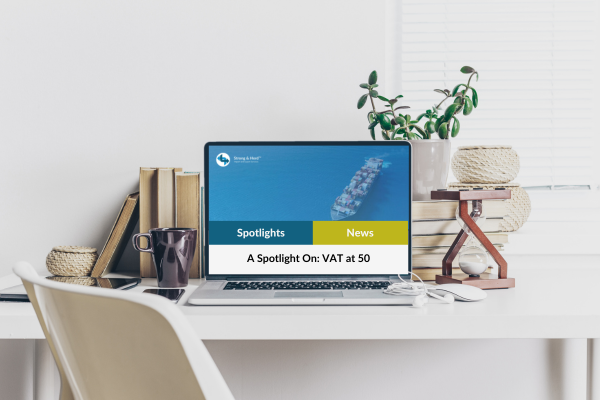BY:
SHARE:

On 22 May, Peter Hughes, Strong & Herd’s VAT associate, attended a conference at the Institute of Chartered Accountants’ office on "VAT at 50". The conference was initially planned to coincide with the 50th anniversary of VAT in the UK, which was on 1 April 1973. However, the conference had to be postponed due to unforeseen circumstances.
Ever since its inception in Michigan in 1953, the concept of VAT has gained global traction and is now implemented in 170 countries worldwide. In the UK, VAT is the third highest revenue generator, surpassing corporation tax and trailing behind income tax and national insurance. Initially set at 10% in 1973, the standard rate of VAT in the UK has stood at 20% since 2011. The UK's VAT system serves as a prominent model for other nations, as evidenced by the Gulf Co-operation Council's adoption of VAT in 2016, where the signatory countries looked to the UK's VAT model for guidance.
During the conference, Rita de la Feria, from the University of Leeds, shared her insights as a speaker. She emphasised that VAT has proven to be beneficial for the UK throughout the past five decades. However, she also pointed out that the current VAT system is outdated and in need of refreshing. The world has changed significantly in the past half-century, but VAT has not. With the rapid advancements in computer technology, it is undeniable that significant progress has been made. However, despite HMRC's introduction of Making Tax Digital in 2019, a survey conducted by EY three years later revealed that one-third of businesses expressed dissatisfaction with HMRC's implementation of the process.
VAT is a standard EU system, but since the UK’s exit from the European Union, it is no longer closely bound to that system. We already see some of the practical implications of this: electronic books were previously standard-rated but are now zero-rated, which happened before the UK left the EU’s VAT territory. The installation of energy-saving materials in dwellings is now zero-rated, having previously been subject to VAT at 5%.
Will we see a broadening of the base of VAT? For example, many bed & breakfast establishments close in winter for a couple of months, enabling them to remain below the VAT registration threshold of £85,000. In 2016, the Government was on the verge of slashing the threshold to as low as £20,000, which would have brought many such businesses within the scope of VAT. Could it still happen in the future, and what are the implications of this for those businesses?
Will there be a change in the way in which invoices are issued? Towards the end of the day, there was a session on VAT in the Digital Age led by Alex Maulf from Avalara. In the EU, the definition of an e-invoice will change from 1st January 2024. A simple PDF document will not be an e-invoice; an e-invoice must be issued, transmitted, and received in a structured electronic format, allowing automatic and electronic processing. From 1st January 2028, e-invoicing will be mandatory in the EU for B2B intra-EU supplies. But this change in legislation binds only EU countries and not (yet) the UK.
For those who operate in the EU, there is a risk that some countries will rush to implement mandatory e-invoicing from 2024 without due consultation with stakeholders, rather than taking their time and implementing e-invoicing by the compulsory date of 2028.
Peter Hughes, F.C.A.
About Peter
Peter Hughes, a certified accountant with expertise in VAT, has been the go-to professional for Strong & Herd's clients' VAT enquiries for the past five years. Peter is available to provide ad hoc assistance in answering VAT-related questions. Additionally, he offers on-site visits to evaluate your company's VAT procedures or deliver comprehensive VAT training to your staff.
These are some of the projects with which Peter has helped our clients:
- A UK supplier dispatches a UK customer’s goods from Italy to Austria, where the goods are processed before being returned to Italy. The UK supplier then invoices the UK customer in respect of the processing work in Austria. The question is whether the UK supplier needs to be VAT-registered in any other country.
- A UK supplier sells and dispatches goods to private consumers in the European Union. The question is whether the UK supplier has any VAT liability, and if so, how it should pay this.
- A UK business has a UK customer to whom it wishes to sell goods. It imports those goods from India and sells the goods to its UK customer when the goods are still in India. There is a retention of title clause in the contract, which applies if the UK customer does not pay for the goods. The question is whether the importer can use the postponed import VAT system to account for import VAT.
- A German business with premises in the UK wishes to buy goods from a UK supplier. The German business will collect the goods from the UK and export them to Germany itself. The question is whether VAT should be charged on the sale of goods to the German business.
- A Northern Irish business buys goods from a supplier in Spain and sells those goods to a customer in Poland. The goods are dispatched from Spain direct to the end customer in Poland. The question is whether the Northern Irish business has any VAT obligations in Spain or Poland.
- A UK business with customers in Hungary retains a stock of goods in Hungary that it can sell to its customer. The question is whether the UK business needs a Hungarian VAT registration.
If you believe that Peter's expertise in VAT consultancy or training would benefit your business, or if you have any unanswered questions, please inform us. We are here to assist you. Contact us at enquiries@strongandherd.co.uk
OneCall™ Email assistance as and when required; A one-call solution for all your import, export and customs enquiries. Export help. Import help. Customs help.
Stay informed about customs and international trade matters by subscribing to our OneCall™ service. This comprehensive offering includes a dedicated email helpline for support, timely practical updates direct to your inbox (Did You Know?), monthly UK Customs & Trade Briefings and access to an interactive members' area with an exclusive community for our subscribers.
International Trade Updates & Spotlight Newsletter
Subscribe to our free information emails covering international trade topics...









